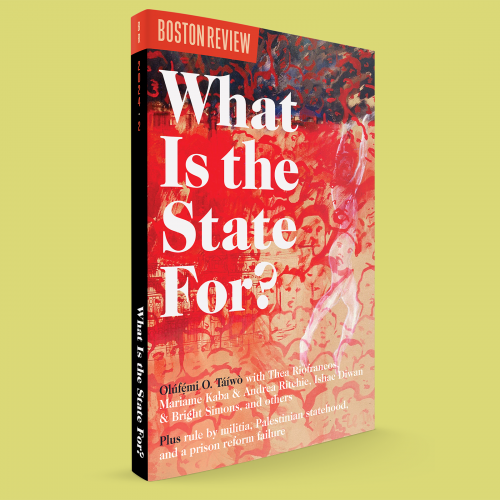These responses raise challenging and clarifying points. A major fault line in the discussion concerns the political scale—and thus the set of actors—we should focus our attention on in order to make atmospherically relevant change.
The widest-angle view is the supranational level. Diwan and Simons see an important role for cooperation among states; at the same time, they argue that recent efforts to “bring the state back” have not taken the state seriously enough. Since states are not reciprocally situated when it comes to climate change, we should not expect much from multilateral diplomacy (à la Kyoto) or new models of global governance (à la the WTO). Our best chance, they think, lies with a more “responsible” version of the “club” path proposed by Nordhaus.
I also think the Nordhaus plan, in its pure form, represents a failure mode of climate politics—likely to lead to “dystopia,” for reasons that Diwan and Simons trace out. Kaba and Ritchie further illuminate why: state imperatives are fundamentally defined by the stick of carcerality. It is thus no surprise that state managers in the Global North interpret their interests in a way that leads dollars away from sustainable development and in the direction of border policing. Migration enforcement arrangements like those between the EU and Tunisia or between the United States and Mexico represent the grim distributional politics of “clubs” that aim not to prevent climate impacts, but to concentrate their worst effects on the most marginalized among us—exactly the logic of carcerality as Kaba and Ritchie lay it out. The “progressive forces” that Diwan and Simons say must mobilize to avoid this result—by building more responsible states across both North and South—will have to be clear-eyed about how the state defends itself.
We have now moved one scale down to states themselves. Guinan and O’Neill also have this sort of focus, arguing that local forms of energy democracy aren’t large enough to displace fossil capital on their own.
I broadly agree: state power is the most plausible route to challenging fossil capital, which would make my perspective on the central political question of the twenty-first century not altogether unlike Wallerstein’s perspective on that of the twentieth. But Guinan and O’Neill focus on the political realities in the United States, the UK, and “the West.” Would it make a similar difference to global ecological prospects if electoral elements of the state of Togo or of El Salvador were won to the cause of ecosocialism? One reason to suspect not is that the state, as such, is less important to the global cause of defeating fossil capital than what (some) states can do. Winning elections without getting sufficient support for the specific project of decarbonization will not get us any closer to climate justice than we are now, whether those elections take place in Britain or Botswana.
This takes us to yet another scale: the grassroots politics and political cultures blossoming across states and underneath them. Baiocchi draws our attention here, highlighting activists and movements that stayed focused on practical questions rather than getting drawn into theoretical debates. And with the case of Mexico, Lomnitz shows that some of the important practical questions are not simply about seizing state power but expanding the state’s basic capacities.
There is a lesson about political culture here: the ethos of the world we seek to build by way of the state should also be cultivated in the state itself. That means we should be attempting not just to wield the levers the state has built for itself but to create institutions within the state that are responsive to popular goals. Baiocchi’s example of the Brazilian Workers’ Party was significant in this sense, too: its call for “participatory budgeting” in the 1980s meaningfully transformed the character of state power in Brazil. This model of democratic empowerment has since been adopted worldwide and is already being used to address climate change at local and regional scales.
I strongly agree with these reminders to attend to practical constraints, and it’s in that spirit that I am trying to displace moralizing questions about what kinds of violence the state may be complicit in with practical ones. What political approaches will do the job of destroying fossil capital, and on terms that are compatible with the worlds we want? I suspect that exactly this tension between moralizing questions and practical ones loomed large in some of the examples Baiocchi points to: for instance, the question of “whether to participate in a system founded and premised on racial subjugation” debated by the Zapatistas, Bolivia’s Movimiento al Socialismo, and Brazil’s Movimiento Negro Unificado. We can take inspiration from the way each movement resolved that tension into action—whether in the form of participation in state politics or calculated withdrawal into another set of effective possibilities.
Next door to a focus on grassroots politics is a focus on the dynamic co-creation of grassroots and state-level politics, which Riofrancos describes. Campaigns to phase out fossil fuels will likely require the levers of the state, but it’s hard to imagine them being pulled from under the noses of fossil fuel lobbyists and bought politicians without serious concerted political pressure from elsewhere. She notes that at least some of the wins we have seen so far, like the Build Public Renewables Act in New York, involved intentional coordination between outsider pressure politics and the boring bureaucracy of state legislatures. Ecuador provides an even grander example: after ten years of campaigning by Indigenous, youth-based, and other grassroots organizations, people voted in a referendum last year to stop all extraction and oil exploration in Yasuní National Park. Of course, it’s a big leap from success even at the scale of a large state to making a global difference. But taking on the task of defeating something on the scale of fossil capital requires setting out to do the unprecedented.
The means for doing so might well be unprecedented themselves—or, at least, new variations on old themes. All of the respondents acknowledge this to some degree or another, but I think Raghuveer offers a particularly interesting way forward. Fossil capital shows up in the lives of most people in the way we meet our most basic needs, including housing. When it comes to organizing political power around preserving the ecology that sets all of our living conditions, it may be that the way forward is refreshingly direct: supporting people organizing around their living conditions.
Raghuveer reminds us of the difference that organizing makes. Through it, people practice doing politics, develop the skills and connections required to do it well, and get opportunities to think with others about what they want and how to get it. These are preconditions for political success on any scale, and the global scale is no exception. It may well be the sort of thing the Brazilian Workers’ Party had in mind when it spoke of the need to “change society as we get there”—the kind of small steps that giant ones are made out of.
Independent and nonprofit, Boston Review relies on reader funding. To support work like this, please donate here.









